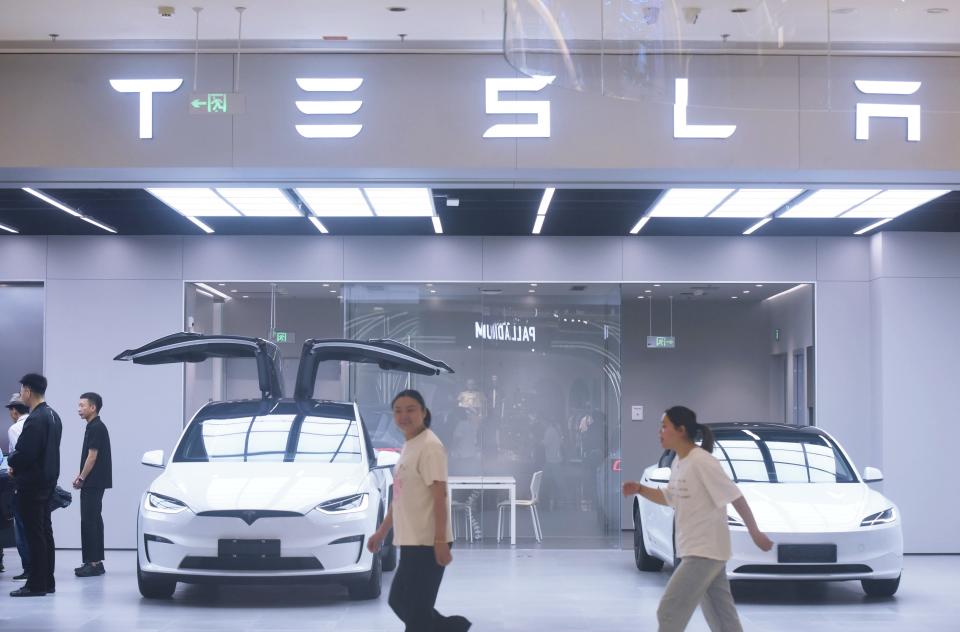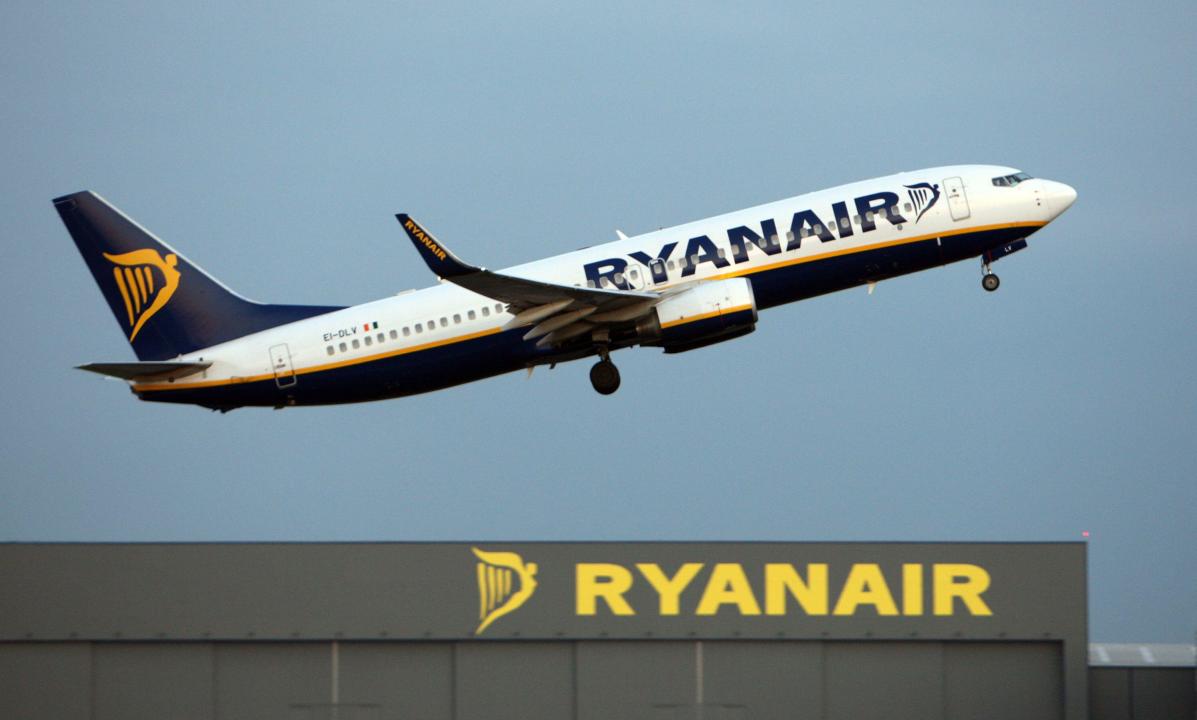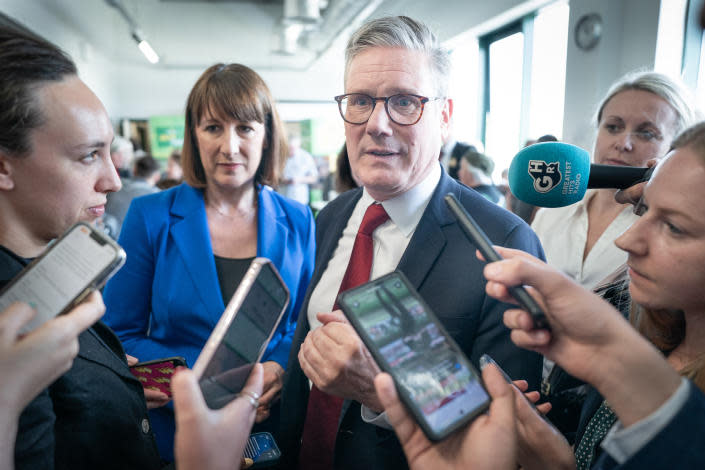FTSE and Europe lower, Wall Street higher as Tesla surges on better-than-expected deliveries


The FTSE 100 (^FTSE) and European stocks were lower on Tuesday, with Wall Street gaining after early losses, as traders digested the latest EU inflation figures. Inflation in the 20-nation eurozone fell slightly from 2.6% in May to 2.5%, amid declining energy prices.
Official figures from Eurostat showed that core inflation, which strips out volatile food and energy prices, was unchanged at 2.9%. Meanwhile, prices in British shops rose at the slowest pace in almost three years last month, according to industry figures that underscore how inflation has cooled.
However, Tesla’s (TSLA) share price was driven higher after the bell in New York, as investors cheered a smaller-than-expected 5% drop in vehicle deliveries in the second quarter.
The electric vehicle maker said price cuts and incentives boosted demand. It handed over 443,956 vehicles in the three months to 30 June, 4.8% lower than a year earlier, and up 14.8% from the prior quarter.
Elsewhere, traders remained cautious ahead of the UK general election on Thursday and the French second election round on 7 July.
Daniela Hathorn, senior market analyst at Capital.com, told Reuters: “Both potential outcomes of this election, whether a far-right or a far-left coalition, don’t give political stability. Both would lead to a lot of indecision, which can cause some concern for investors.”
-
London’s benchmark index was 0.5% down, hitting its lowest in more than two weeks.
-
Germany’s DAX (^GDAXI) dipped almost 0.8% and the CAC (^FCHI) in Paris headed 0.3% into the red.
-
The pan-European STOXX 600 (^STOXX) was 0.4% lower.
-
Wall Street pushed higher ahead of jobs data and amid comments from Fed chair Jerome Powell.
-
The pound was 0.25% higher against the US dollar (GBPUSD=X) at 1.2681.
Follow along for live updates throughout the day:
Live25 updates
-
Blog close
Well that’s all folks — thanks for following along. Be sure to join us again tomorrow when we’ll be back for more of the latest market moves, and all things happening across the global economy.
Until then…
Have a good evening!
-
‘We are not leaving city centres’, says Marks & Spencer boss
Bosses at Marks & Spencer have said they will not “leave city centres” amid criticism from shareholders over moving some stores to out-of-town developments.
It came as the retail giant announced plans to invest £38m in major new high street stores in Bath and Bristol at its annual general meeting in west London.
The retailer has undergone a sweeping overhaul under chief executive Stuart Machin, and previous boss Steve Rowe, which saw the group shake up its store estate.
In 2019, the group launched 110 store closures as part of the plans, affecting a number of its longstanding high street shops.
The group’s bosses were asked whether they have “given up on the high street” at the AGM on Tuesday, amid concerns they are shifting increasingly towards retail parks.
Archie Norman, chairman of the business, said:
“No, we haven’t given up on the high street. We have a very important store rotation programme but we are absolutely not trying to leave city centres – that has never been our intention.
“We do have some older stores that are hard and costly to maintain and run so we have to look at that.”
-
S&P Global issues debt warning to world’s top economies
The United States, France and other major economies are unlikely to put a brake on rising debt levels in the coming years, according to credit rating agency S&P Global.
The assessment comes ahead of elections in the UK, France and the US where political parties are promising to improve economies, social services and voters’ daily lives.
S&P said on Tuesday:
“We estimate that – for the US, Italy and France – the primary balance would have to improve by more than 2% of GDP cumulatively for their debt to stabilise; this is unlikely to happen over the next three years.
“In our view, only a sharp deterioration of borrowing conditions could persuade G-7 governments to implement more resolute budgetary consolidation at the present stage in their electoral cycles.”
-
Tesla shares surge 9% on better-than-expected deliveries
Investors drove Tesla’s share price higher on Tuesday, after the bell in New York, cheering a smaller-than-expected 5% drop in vehicle deliveries in the second quarter.
The electric vehicle maker said price cuts and incentives boosted demand. It handed over 443,956 vehicles in the three months to 30 June, 4.8% lower than a year earlier, and up 14.8% from the prior quarter.
-
How to make sure you don’t get underpaid when it comes to state pension


The state pension often forms the backbone of our retirement income and it’s fair to assume that when the time comes to claim it you will get the right amount. However, this is not always the case and gaps in your national insurance record can cost you dearly.
Under the current system you need 10 years’ worth of national insurance credits to qualify for the new state pension and 35 years’ worth are needed to get the full amount which is currently around £11,500 per year.
However, many people have gaps in their national insurance record — for instance when they’ve spent time out of the workforce caring for loved ones — and this can affect their entitlement.
Getting less than you were expecting can come as a nasty surprise but there are things you can do about it.
-
Second-hand EVs and hybrid cars prices fall 20%
The average price of the UK’s most sought-after electric and hybrid used cars fell by 20% year-on-year in the second quarter of 2024, the latest AA Cars’ Used Car Index reveals.
The two most popular cars on the list, the Toyota Yaris and Toyota Prius, fell by 19% and 52% respectively over the past 12 months.
In contrast, the average price of the 20 most popular used petrol and diesel cars on the platform increased (3.5%) in the three months to June.
James Hosking, director of AA cars, said:
“Demand for second-hand EVs and hybrid vehicles continues to rise, but prices are coming down thanks to a surge in supply.
“Buyers are seeing lower average prices as corporate leases begin to expire and thousands of former fleet EVs come onto the second-hand market for the first time – providing greater choice and more attractive prices for buyers.
“The overall downward pressure on pricing is likely to continue, but reductions vary considerably between different makes and models.
“Prices of the most popular petrol and diesel used cars have rebounded after falling for two consecutive quarters, although in most cases the increases are relatively modest.
“Buyers will find that prices for a lot of used cars are still considerably lower than they were this time last year, and that there are plenty of good deals out there.”
-
Ryanair carries record passengers


Undated file photo of a Ryanair plane taking off from Stansted Airport. Ryanair has recorded its busiest month in terms of passenger numbers, having said 19.3 million passengers booked tickets for its flights in June, up 10.9% from 17.4 million during the same month last year. Issue date: Tuesday July 2, 2024. (Chris Radburn, PA Images) Ryanair hailed its busiest ever month in June as increases in ticket prices were less severe than initially feared.
The Dublin-based airline said 19.3 million passengers booked tickets for its flights in the month, an increase of 10.9% compared to the same month last year.
Meanwhile Wizz Air suffered a decline in passenger numbers over the same period, seeing just 5.3m passengers — a 0.2% fall from the year before.
The Hungarian low-cost carrier said load factor, the proportion of seats filled, fell by 0.6 percentage points to 91.7%, reflecting “a focus on overall revenue management”.
-
HSBC on cost-cutting drive
HSBC is slowing down staff hiring and asking investment bankers to rein in their travel and entertainment expenses.
It comes as outgoing boss Noel Quinn seeks to curb costs at Europe’s largest lender.
In some cases, the bank said it is not replacing staff who have left or resigned in recent months, people familiar with the matter told Bloomberg.
Some businesses have been told to pause hiring altogether, though the freeze isn’t meant to impact client-facing roles, it was revealed.
Investment bankers have been encouraged to set up at least 3 client meetings a day in order to make the most of work travel. Employees in some divisions were reminded of some of the expectations on work travel at a company town hall in recent days, Bloomberg was told.
-
Wall street to open lower ahead of jobs data and Powell speech
US stock futures are set to open lower in an hour’s time, ahead of jobs opening data and US Federal Reserve chairman Jerome Powell speaking at a European central banking conference.
The job openings and labour turnover survey, known as JOLTS, is expected to show a fall to 7.91 million in May, down from 8.059 million the month before.
The Dow Jones is set to open 0.4%, lower, while the Nasdaq is looking to slide 0.6% at the open. The S&P 50 is expected to lose 0.5% after the bell.
The sense of caution also comes the Independence Day public holiday on Thursday and then influential jobs data out on Friday.
-
Tesla gains ahead of quarterly production and delivery report


EV maker Tesla (TSLA) saw its shares gain around 6% on Monday, but was lower in premarket the following day, as investors look to its quarterly production and delivery report later on.
Wall Street brokerage Wells Fargo added the stock to its “tactical ideas” watch list ahead of the data, but kept it at an “underweight” rating as other companies close in on the EV market in key territories.
China’s BYD (1211.HK), for example, said it had seen a 21% rise in second-quarter electric vehicle sales, selling 426,039 EVs in the April-June quarter, according to a Reuters report.
Last week, Tesla said that it would recall most of its Cybertrucks due to a fault with the windshield wipers and exterior trim. This would be the fourth time the vehicle has been recalled in the US.
The disclosure revealed the number of vehicles affected by the recall — 11,688 trucks — which would equate to the number of Cybertrucks sold, since it includes vehicles in use and in transit to customers. Because Tesla does not officially break out Cybertruck sales in its quarterly delivery report, getting a read on early Cybertruck sales is noteworthy.
-
Noon update: European shares fall as investors temper risk exposure
European shares slid lower on Tuesday as investors preferred to temper their risk exposure while digesting the latest macro developments.
Market sentiment was under pressure after investors received hawkish hints from ECB officials Lagarde and Lane, who said they need more evidence that inflation is ticking down in the region.
Pierre Veyret, technical analyst at ActivTrades, said:
“With monetary policies still seen as the most important market driver for stocks, such news’s impact doesn’t surprise, especially as key EU CPI data looms this morning.”
“The YoY inflation data is widely expected to show a slight decrease from 2.6% to 2.5%, and any figure outside of that window could significantly affect price action and lead to spikes across a wide range of assets today.”
“Meanwhile, investors have struggled to find more reasons to remain long on equities as political uncertainty in Europe and the UK lingers this week.”
“The STOXX-50 index pulled back towards 4,900pts, dragged down by almost all sectors, with the worst performers among financial and healthcare shares.”
“Again, we knew this week’s busy macro agenda would be challenging for stock investors to assess, and it is translating into increased market volatility for traders.”
-
Brexit brings dire warnings for Trumpism
When Britain voted to exit the European Union in 2016, Donald Trump, then the Republican candidate for president, declared himself “Mr. Brexit.” Trump claimed solidarity with the nationalism, isolationism, and anti-immigrant fervor that drove Brexiteers and incorporated it into the America First platform he pursued after winning the 2016 presidential race.
Brits now view their populist experiment as a dismal failure. Champions of Brexit, such as former Prime Minister Boris Johnson, promised that severing political and economic integration with most of the rest of Europe would boost prosperity and self-sufficiency and leave more money for government services.
Instead, the UK economy has stagnated, with income and economic growth lower than it would have been otherwise. Those effects are likely to worsen through 2035. Most Brits now suffer “Bregret,” with polls in early June showing a record 69% of Brits thought Brexit turned out to be the wrong move. The fiasco is a major contributor to the collapse of Prime Minister Rishi Sunak’s Conservative government — and the party’s likely shellacking in the upcoming July 4 election.
It’s like watching a laboratory experiment where the guinea pigs die. Yet Trump still sounds like Mr. Brexit, vowing that if he wins a second term, he will impose even more trade barriers, more isolation, and more go-it-aloneness than he did during his first term.
-
Rupert Murdoch launches free Tubi in UK
Rupert Murdoch’s Fox Corporation has launched a free streaming service in the UK, adding to an already crowded market that includes the likes of Netflix, Disney+, Apple TV and Amazon.
The platform Tubi, a free service supported by advertisements, has already snapped up 80 million viewers in the US, with more than 20,000 films and television shows.
This includes content produced by Disney, NBCUniversal, Sony Pictures among a host of other studios.
-
Q2 sees biggest boost to buyer demand levels


File photo dated 04/12/14 of members of the public looking in the window of an estate agents in South Kensington, London. Average UK house prices have increased for the first time since June last year, according to the Office for National Statistics who found average house prices increased by 1.8% in the 12 months to March, signalling potential green shoots in the UK’s property market. This lifted the average house price across the UK to £283,000, up from £281,000 in the previous month. Issue date: Wednesday May 22, 2024. (Daniel Leal-Olivas, PA Images) The latest Homebuyer Hotspots Demand Index by estate agent comparison site, GetAgent.co.uk, has revealed that buyer demand levels climbed significantly between the first and second quarters of this year, marking the largest quarter to quarter jump since interest rates started to climb in December 2021 and the third consecutive quarter of positive growth.
The latest index shows that: –
-
In Q4 2021, buyer demand stood at 65.6%, however, as interest rates started to climb, GetAgent recorded five consecutive months of declining demand.
-
The latest index shows that 44.2% of all homes listed for sale across England had found a buyer in Q2 of this year. This marks a +2% increase in buyer demand levels when compared to Q1 2024, the largest quarterly increase seen since interest rates first started to increase in Q4 2021.
-
Nowhere more so has demand increased over the last quarter than across Northumberland, with a +5.4% increase.
-
South Yorkshire has also seen a considerable increase at +4.2%, with Bedfordshire (+4%), Leicestershire (+4%) and Northampton (+3.8%) also ranking within the top five largest quarterly increases.
-
Annually, national demand remains down marginally versus this time last year at -0.4%. However, a number of areas have also posted strong annual improvements.
-
Bedfordshire has seen the largest annual increase in buyer demand, up 5.4%, followed by London (+5.2%), Northamptonshire (+2.7%), Essex (+2.2%) and Leicestershire (+1.8%).
-
-
What a Labour election win could mean for investors


Labour’s strong lead in the polls puts the party on course to form the next UK government.
Leader Keir Starmer has announced policies and changes in the party’s manifesto that could have a wide-ranging impact on investors and savers.
As the UK heads to the polls on 4 July, what could a Labour win mean for investors?
-
ECB not expected to cut rates
The latest fall in eurozone inflation comes after the European Central Bank (ECB) cut interest rates for the first time since 2019 on 6 June.
Economists are not expecting another rate cut at July’s meeting, however, there are growing expectations that it could lower rates later this year.
The ECB in June also revised its predictions, expecting eurozone inflation to come in at 2.2% in 2025 before falling to 1.9% the following year.
ECB president Christine Lagarde said on Monday:
“Our work is not done, and we need to remain vigilant. We will not rest until the match is won and inflation is back at 2pc.
-
Slowing prices will provide relief to ECB
Overall, slowing price rises in the 20 countries that share the euro will provide some relief for the European Central Bank.
Last month the ECB cut interest rates in expectation of inflation hitting its 2% target by next year.
Kyle Chapman, FX markets analyst at Ballinger Group, said:
“Beyond a slight cooling in food prices, today’s report is a virtual repeat of the May data, and that’s enough to set in stone a pause at this month’s ECB meeting.
“The stickiness in services inflation may start to become a real concern for policymakers that puts a spanner in the works for rate cuts, particularly given the backdrop of rising wage growth and falling unemployment.”
“The data confirms that it’s not over yet, and a linear downward path for rates is very clearly out of the question. There has been no concrete downtrend in services inflation this year, and the ECB isn’t likely to cut rates significantly until one emerges.”
Later today, Federal Reserve chair Jerome Powell and European Central Bank president Christine Lagarde are speaking at the ECB’s forum on central banking at Sintra, Portugal.
The flash estimates on Tuesday had little impact on the euro, with French political uncertainty instead stealing the spotlight from monetary policy.
-
Eurozone inflation falls to 2.5%
Inflation in the eurozone slowed slightly last month, falling from 2.6% in May to 2.5% in June as expected.
Official figures from Eurostat showed that core inflation, which strips out volatile food and energy prices, was unchanged at 2.9%, as services inflation remained stubbornly high at 4.1%.
It had been predicted to fall to 2.8%.
-
Shoe Zone shares plunge after profit downgrade
Shoe Zone (SHOE.L) fell out of favour with investors on Tuesday, losing almost a fifth of its value after it downgraded its profit forecast again.
The shoe retailer blamed higher shipping costs due to Red Sea disruption, as well as poor weather.
It now expects adjusted profit before tax for the year to 2 October to be around £10m.
It comes as Shoe Zone had already cut its profit outlook to £13.8m in May, as it was hit by shipping delays and higher wage costs following the National Living Wage increase.
The firm said container prices had risen “significantly” over the last six months, as a result of the reduction in the number of shipping vessels and the additional costs of rerouting away from the traditional Suez Canal route.
Meanwhile, spring and summer sales had been weaker than expected between April and June due to “unseasonal weather conditions”.
-
Petrol and diesel prices fall for second consecutive month
Petrol and diesel prices fell for a second straight month in June, it has been revealed.
According to the RAC’s monthly fuel watch, the average price of petrol in the UK at the end of last month was just under 145p a litre, down from 148p at the start of the month.
Meanwhile, diesel dropped from nearly 154p to about 150p.
“Fuel prices are still nowhere near where they should be despite falling for the second consecutive month,” the RAC said.
It highlighted the lower cost of filling up in Northern Ireland, where petrol is 4.5p a litre cheaper on average and diesel 8p cheaper than in the rest of the UK.
Simon Williams, head of policy at the RAC, said:
“While it’s good news prices at the pumps have fallen for the second month in a row, this also leaves a bad taste in the mouth because we know drivers in Great Britain are continuing to get a raw deal as both petrol and diesel are still much more expensive than in Northern Ireland.
Watch: What is a recession and how do we spot one?
Download the Yahoo Finance app, available for Apple and Android.






